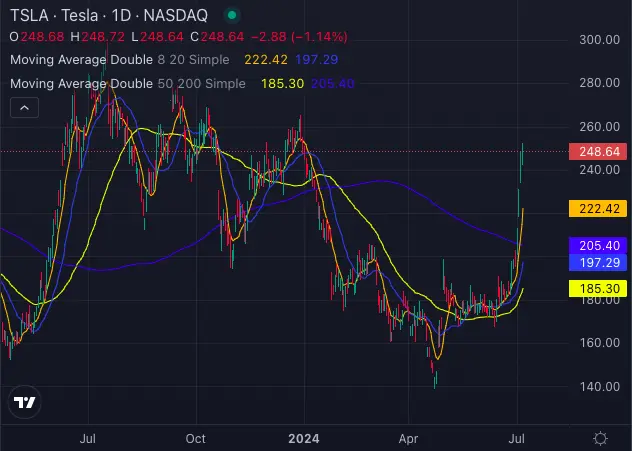Tesla, Inc. stands as a prominent player in the automotive and clean energy sectors. This analysis delves into the company’s market position, influencing factors, and potential risks for investors considering Tesla shares.
Company Overview
Key information:
Headquarters: Austin, Texas
CEO: Elon Musk
Founded: July 1, 2003
Stock symbol: TSLA (NASDAQ)
Product lineup:
Vehicles: Model S, Model 3, Model X, Model Y, Cybertruck, Tesla Semi
Energy products: Powerwall, Powerpack, Solar Roof
Historical Milestones
2008: Introduction of the Roadster
2012: Model S launch
2015: Model X debut
2017: Model 3 production begins
2020: Model Y release
2022: Cybertruck production starts

Market Situation
The electric vehicle (EV) market experiences rapid growth, with increasing competition from established automakers and new entrants.
Industry Overview
EV market characteristics:
- Growing demand for sustainable transportation
- Technological advancements in battery technology
- Government incentives promoting EV adoption
Competitive Landscape
Main competitors:
- Ford
- General Motors
- Volkswagen
- NIO
- BYD
Tesla’s market position:
1. Leader in EV sales globally
2. Strong brand recognition
3. Technological innovation in batteries and autonomous driving
Market Share Data
Table: Global EV Market Share (2022)
| Company | Market Share |
|---|---|
| Tesla | 19.9% |
| BYD | 15.2% |
| SGMW | 7.8% |
| VW Group | 7.3% |
| Others | 49.8% |
Influencing Factors
Several internal and external factors impact Tesla’s performance and stock price.
Internal Factors
Production capacity:
Gigafactory expansion
Manufacturing efficiency improvements
Technological innovation:
Battery advancements
Autonomous driving capabilities
Product lineup:
Introduction of new models
Updates to existing vehicles
Financial performance:
Revenue growth
Profitability metrics
External Factors
Regulatory environment:
Government incentives for EVs
Emissions standards
Economic conditions:
Consumer spending patterns
Raw material costs
Competition:
New entrants in the EV market
Advancements by established automakers
Global events:
Supply chain disruptions
Geopolitical tensions
Analyst Opinions
Diverse perspectives from financial analysts provide insights into Tesla’s potential performance.

Bullish Outlook
John Smith, Senior Analyst at Global Investments:
“Tesla’s continuous innovation and market leadership position it for long-term growth. The company’s expansion into energy storage and solar products diversifies its revenue streams.”
Key points:
Strong brand loyalty
Technological edge in EV manufacturing
Potential for expansion in emerging markets
Cautious Stance
Sarah Johnson, Head of Equity Research at Market Insights:
“While Tesla shows promise, increased competition and potential regulatory challenges pose risks. Investors should monitor production targets and profitability metrics closely.”
Concerns:
Valuation concerns
Dependence on government incentives
Manufacturing scalability challenges
Neutral Assessment
Michael Chen, Technology Sector Analyst at Investment Solutions:
“Tesla’s stock presents both opportunities and risks. The company’s innovative approach drives growth, but execution risks remain as it scales production and enters new markets.”
Factors to watch:
Battery technology advancements
Expansion of charging infrastructure
Consumer adoption rates of EVs
Prospects and Risks
Understanding potential growth drivers and risks provides a balanced view for investors considering Tesla shares.
Growth Factors
Market expansion:
Entry into new geographical markets
Increased EV adoption rates globally
Product diversification:
Energy storage solutions
Solar energy products
Technological advancements:
Improved battery technology
Enhanced autonomous driving capabilities
Manufacturing efficiency:
Increased production capacity
Cost reduction through economies of scale
Risk Factors
Competition:
Established automakers entering the EV market
New EV startups gaining traction
Regulatory changes:
Potential reduction in government incentives
Stricter safety regulations for autonomous vehicles
Supply chain disruptions:
Raw material shortages
Global logistics challenges
Economic downturns:
Reduced consumer spending on high-end vehicles
Potential impact on government subsidies for EVs
Examples of Companies Facing Similar Risks
Nissan:
Experienced production delays and quality issues with the Leaf EV
Impact: Reduced market share in the EV segment
Fisker Automotive:
Faced battery supplier bankruptcy and regulatory challenges
Outcome: Filed for bankruptcy in 2013
General Motors:
Recall of Chevrolet Bolt due to battery fire risks
Consequence: Significant financial costs and reputational damage
How to Buy Tesla Shares
Investing in Tesla shares requires careful consideration and following specific steps.
Process overview:
1. Choose a brokerage
3. Open an account
3. Fund your account
4. Research Tesla stock
5. Place an order
Selecting a Brokerage
Factors to consider:
Trading fees
Account minimums
Research and analysis tools
User interface and mobile app availability
Account Setup
Required information:
Personal identification
Social Security number
Employment details
Financial information
Funding Options
Common methods:
Bank transfer
Wire transfer
Check deposit
Researching Tesla Stock and Order Types
Financial statements
Price-to-earnings ratio
Revenue growth
Market share trends
Market order: Buy at current market price
Limit order: Set maximum purchase price
Stop order: Triggers buy when stock reaches specified price
Conclusion
Tesla’s position in the EV market presents both opportunities and challenges for investors.
Summary table:
| Aspect | Assessment |
|---|---|
| Market position | Leader in global EV sales |
| Innovation | Strong focus on technology and product development |
| Financial health | Growing revenue, improving profitability |
| Risks | Increasing competition, regulatory challenges |
| Growth potential | Expansion into new markets and product lines |
Investor considerations:
Assess risk tolerance
Evaluate long-term growth potential
Monitor market trends and company performance
Diversify investment portfolio
FAQ
What factors most significantly impact Tesla’s stock price?
Key factors include:
Quarterly delivery numbers
Profitability metrics
New product announcements
Regulatory changes affecting the EV market
Elon Musk’s public statements and actions
How does Tesla’s valuation compare to traditional automakers?
Tesla’s market capitalization often exceeds that of many established automakers combined. This valuation reflects investor expectations of future growth and Tesla’s position as both an automotive and technology company. However, traditional metrics like price-to-earnings ratios may appear high compared to legacy automakers.
What role does Tesla’s energy business play in its overall valuation?
While Tesla’s automotive segment generates the majority of revenue, its energy business contributes to the company’s long-term growth potential. The energy division, including solar products and energy storage solutions, aligns with global trends toward renewable energy adoption. Investors often factor in this diversification when assessing Tesla’s future prospects and overall valuation.
